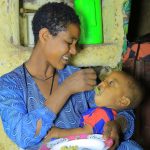IFPRI/ESSP is pleased to present its quarterly newsletter for the month of July - September 2025. The newsletter provides updates on latest publications. It also gives recaps of the program's surveys, publications, blogs and more. Read more >>
ግብርናን ሳንለውጥ ሌላውን ዘርፍ ልናሳድግ አንችልም ታደሰ ዝርፉ (ዶ/ር)
አሁን ያለንበት የግብርና እና የምግብ ፖሊሲያችንን ብንመለከት በዋነኝነት የሚያተኩረው ዲዳጃታላይዜሽንና የክላሰተር እርሻ ላይ ነው፡፡ ይህም በግብርና ትራንስፎርሜሽን ኢንስቲትዩት የሚመራ ሲሆን በተለይ መከናይዜሽን እርሻ ላይ ትኩረት ተደርጎ እየተሠራ ነው፡፡ በቅርቡ አንዳውም በግብርና ሚኒስቴርና አስተባባሪነት ሁሉም ዘርፎች ያሉበት 22 ስርነቀል ለውጥ የሚያመጡ መርሐ ግብሮች እየተተገበሩ ይገኛሱ፡፡ ጋዜጣ_ፕላስ፦ ኢትዮጵያ የምግብ ሱዓላዊነቷን ማረጋገጥ ያስችላት ዘንድ በርካታ የልማት መርሐ ግብሮችን […]
From data to decision: How the National Information Platform for Nutrition (NiPN) bridges the research-policy gap in Ethiopia’s nutrition sector
Bridging the gap between research and policy continues to be a major challenge in Ethiopia, particularly in the nutrition sector, where evidence is often fragmented, inconsistently collected, and underutilized. Traditional research-to-policy approaches are frequently misaligned with policymaking needs due to differences in timelines, priorities, and communication practices. While these challenges are not unique to Ethiopia—and […]
Does small-scale irrigation affect women’s time allocation? Insights from Ethiopia
Small-scale irrigation (SSI) interventions have received increasing attention as a potential pathway for women’s empowerment in sub-Saharan Africa. One key aspect of women’s empowerment that SSI can influence is women’s time burden. Hypothesized benefits of SSI for women are less energy exertion and reduced labor in agriculture. Yet, these hypotheses have not been tested empirically. […]
Ethiopia launches groundbreaking UN initiative to prevent child wasting
The Federal Ministry of Health, in partnership with the World Health Organization (WHO), United Nations Children's Fund (UNICEF) and World Food Programme (WFP), officially launched the Joint UN Initiative for the Prevention of Wasting (JUNIPr) in Ethiopia. The initiative aims to accelerate national efforts to prevent child wasting—a severe and life-threatening form of malnutrition that […]
- « Previous Page
- 1
- …
- 3
- 4
- 5
- 6
- 7
- …
- 123
- Next Page »




